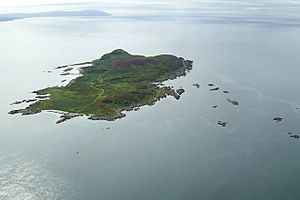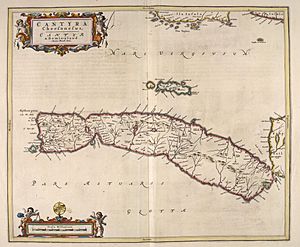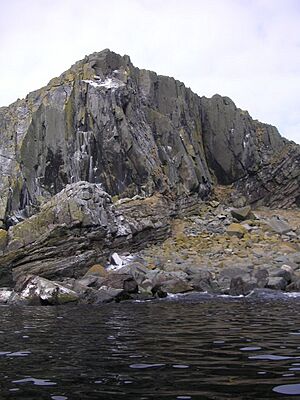Cara Island facts for kids
| Gaelic name | Cara |
|---|---|
| Meaning of name | may be "Kari's island" or "dearest" |
| OS grid reference | NR639440 |
| Coordinates | 55°38′N 5°45′W / 55.63°N 5.75°W |
| Physical geography | |
| Island group | Islay |
| Area | 66 ha (1⁄4 sq mi) |
| Area rank | 178= |
| Highest elevation | 56 m (184 ft) |
| Administration | |
| Sovereign state | United Kingdom |
| Country | Scotland |
| Council area | Argyll and Bute |
| Demographics | |
| Population | 0 |
Cara Island (called Cara in Scottish Gaelic) is a small island located just off the west coast of Kintyre in Scotland. Even though no one lives there permanently, it's a really interesting place with a rich history and unique wildlife.
Where is Cara Island?
Cara Island is found about 1 kilometer (or 0.6 miles) south of Gigha, another Scottish island. You can reach Cara Island from Gigha, often by boat.
The name "Cara" comes from the Scottish Gaelic language. It means "dearest" or "dear one." It's a popular name for girls in Scotland.
Cara Island's Past
Cara Island has seen some exciting events over the years. In 1881, a trading ship called the Henrietta from Brixham sank near the island. The ship's captain sadly fell overboard and drowned. His body later washed ashore far away on the Pentland Skerries. Luckily, the rest of the crew made it safely to Cara Island.
Today, Cara Island is owned by the MacDonald Lockhart family of Kintyre. It's special because it's thought to be the only island still owned by a direct descendant of the Lord of the Isles. The only building on the island, Cara House, is now empty and falling apart.
During World War II, on September 22, 1940, a large ship called the Aska was sunk. German bombers attacked it, and it hit rocks northwest of Cara Island.
Wild Goats of Cara
Cara Island is famous for its herd of feral goats. These wild goats live freely on the island's rugged landscape and are a common sight for visitors. They have adapted well to the natural environment of Cara.
Myths and Legends
Cara Island is also known for its connection to old Scottish stories and myths. It's said to be the home of the Uruisg, also known as a "broonie." A broonie is a friendly spirit that was believed to help families, like the Macdonald of Largie family.
At the very southern tip of the island, there's a special rock formation. It's known as the "Broonie's Chair." This spot is part of the island's magical folklore.
 | Isaac Myers |
 | D. Hamilton Jackson |
 | A. Philip Randolph |




